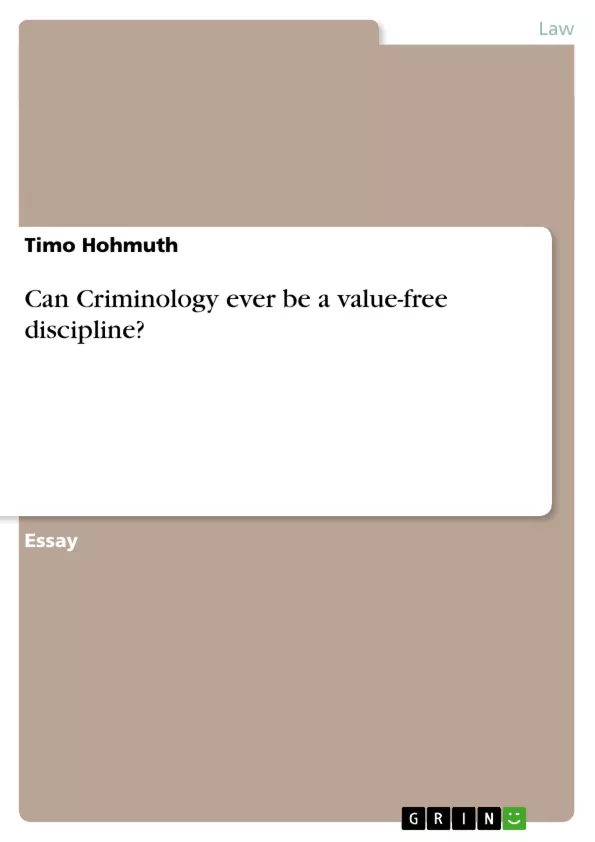Criminology is not a typical law discipline. It can be referred to as an interdisciplinary subject
dealing a lot with sociology, psychology, statistics, medicine, economics, political science and
geography. It is concerned with a body of knowledge about crime as a social phenomenon. A
broad definition would be that crime is behaviour that breaks the law. The studies of crime are
supposed to include in their scope describing, analysing and explaining the behaviour of state penal
law. This seems to make criminology a rather analytical subject. But is it therefore really valuefree
and, if not, should or can it ever be? If we speak of values, we mean emotional attitudes in a
subjective way of seeing things as well as moral values. This examination shall basically be focused
on the influence of emotional attitudes and if criminology can be free from opinions and
subjective views. In some way this is the personal reflection of moral values, too. Specifying the
question it should be asked if criminology is or can be practised and used in an objective and
neutral way.
Table of Contents
- Introduction
- The Nature of Criminology as a (Legal) Science
- Criminology as a Statistical Science
- Criminology as a Current Affair
- Criminology as a Political Device
- Philosophical and Theoretical Approachments
- Criminology in British Politics
- Conclusion
Objectives and Key Themes
This essay explores the question of whether criminology can ever be considered a value-free discipline. It examines the inherent nature of criminology as a legal science and analyzes its potential to be objective and neutral in its practices.
- The influence of emotional attitudes and subjective views on criminological analysis.
- The role of statistics and their limitations in providing a value-free understanding of crime.
- The impact of the media on public perception of crime and how it affects the value-free nature of criminology.
- The use of criminology as a political device and its potential to be manipulated for ideological purposes.
- The philosophical and theoretical approaches to criminology that influence its value-free potential.
Chapter Summaries
- Introduction: The essay introduces the complex nature of criminology as an interdisciplinary subject and raises the question of whether it can be truly value-free, considering the influence of emotional attitudes and moral values.
- The Nature of Criminology as a (Legal) Science: This chapter explores the scientific nature of criminology and its potential to be objective and value-free. It examines the use of statistics in criminology and their inherent limitations, highlighting the potential for manipulation and subjective interpretation.
- Criminology as a Statistical Science: This section delves into the role of statistics in criminology, analyzing their value-free nature and their potential for influencing public perception. It examines how statistics can be presented and used in ways that shape opinions and attitudes.
- Criminology as a Current Affair: This chapter explores the impact of the media on public perception of crime and how it influences the value-free nature of criminology. It examines the role of the media in shaping public opinion and the potential for manipulation and biased reporting.
- Criminology as a Political Device: This section examines the use of criminology for political purposes, discussing its potential to be exploited for pragmatic and ideological goals. It analyzes the role of political discourse and its influence on criminological research and practice.
- Philosophical and Theoretical Approachments: This chapter explores the philosophical and theoretical perspectives that shape the study of criminology. It examines the influence of Marxist theory and the inherent moralistic nature of the discipline. It discusses the role of “magicians” and “priests” in criminology and their respective approaches to knowledge and practice.
- Criminology in British Politics: This section delves into the role of criminology in British politics, highlighting how it has been used as a tool for political gain. It examines the “Law and Order” debate and the potential for political agendas to overshadow the search for truth in criminology.
Keywords
This preview focuses on key concepts like value-free discipline, criminology as a legal science, statistics in criminology, media influence, political manipulation, philosophical and theoretical approaches, and the role of criminology in British politics. It also explores key themes such as emotional attitudes, objectivity, public perception, and the search for truth in criminology.
Frequently Asked Questions
Can criminology be a truly value-free discipline?
The essay explores this question, suggesting that because criminology deals with social phenomena, crime, and punishment, it is inherently influenced by moral values and emotional attitudes.
How do statistics influence objectivity in criminology?
While statistics seem objective, their selection, presentation, and interpretation can be subjective, often serving to shape public opinion or political agendas.
What is the role of the media in criminological perception?
The media often focuses on sensational crimes, which can distort public perception and influence the value-free nature of how crime is studied and policed.
In what way is criminology used as a political device?
Governments may use criminological research to justify "Law and Order" policies, making the discipline a tool for ideological or pragmatic political goals.
How do philosophical approaches impact criminological research?
Theories like Marxism or different moralistic perspectives shape the researcher's view on what causes crime and how society should respond to it.
What is the difference between "magicians" and "priests" in criminology?
This theoretical distinction refers to different roles criminologists play—either as objective observers of knowledge or as moral guardians and practitioners within the system.
- Quote paper
- Dr. Timo Hohmuth (Author), 2000, Can Criminology ever be a value-free discipline?, Munich, GRIN Verlag, https://www.grin.com/document/31317



